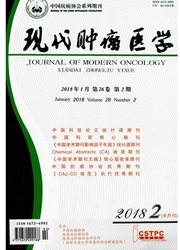

 中文摘要:
中文摘要:
目的:研究索拉菲尼(Sorafenib)诱导的自噬在肝癌细胞凋亡中的作用。方法:体外培养肝癌细胞Huh7和LH86细胞株。分为对照组、Sorafenib处理组、Bafilomycin处理组、Sorafenib+Bafilomycin处理组。将构建的质粒表达载体pEGFP-N1-LC3分别转染Huh7和LH86细胞株,用索拉菲尼或者索拉菲尼加Bafilo-mycin同时处理细胞,通过荧光显微镜观察对照组和处理组细胞内细胞自噬小体形成情况。免疫印迹(West-ernblot)方法检测细胞自噬作用标志蛋白LC3以及细胞凋亡蛋白Caspase3切割条带在各组中的表达,Heochst33342染料对各组细胞核进行染色,以评估细胞自噬作用对索拉菲尼诱导细胞凋亡的影响。结果:在荧光显微镜下,可以观察到Sorafenib能够显著诱导两种肝癌细胞株发生自噬作用。抑制剂Balfilomycin能够显著抑制Sorafenib诱导的自噬作用。Balfilomycin抑制自噬能够显著增强Sorafenib诱导的细胞凋亡。结论:Sorafenib能够诱导肝癌细胞产生自噬作用。这种自噬作用在Sorafenib诱导的肝癌细胞凋亡中起到负调控作用。
 英文摘要:
英文摘要:
Objective:To investigate the roles of autophagy of Sorafenib - induced apoptosis in hepatocellular carcinoma (HCC) cells. Methods:Two cell lines including Huh7 and LH86 were cultured in vitro. We set up control group, Sorafenib -treated group, Bafilomycin -treated group and Sorafenib plus Bafilomycin -treated group. Cells untreated or treated with various conditions were observed under microscope to show autophasome formation. Western blot was performed to detect apoptotic marker molecule Caspase 3 cleavage activation and autophagy marker protein LC3. Results:Sub lethal Sorafenib induced apparent autophagy in Huh7 and LH86 cells. Inhibition of autophay by Bafilomycin significantly sensitized Sorafenibinduced apoptosis in HCC cells. Conclusion:Autophagy negatively regulates Sorafenib- induced apoptosis in HCC cells.
 同期刊论文项目
同期刊论文项目
 同项目期刊论文
同项目期刊论文
 期刊信息
期刊信息
